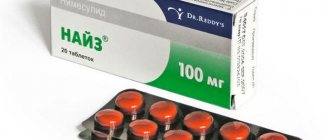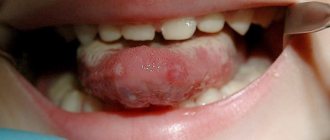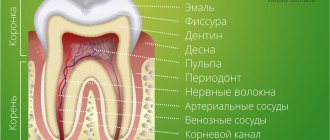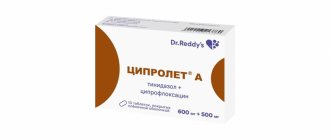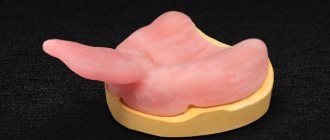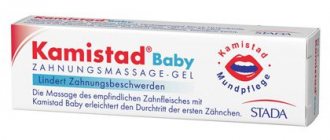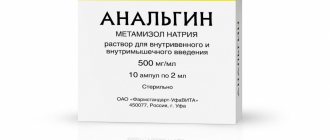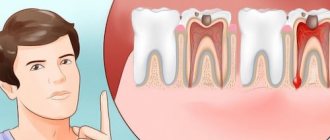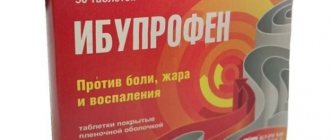Characteristics of Tsifran
Cifran is an antibiotic of the fluoroquinol group. It is used for infectious diseases that are accompanied by a strong inflammatory process. The effectiveness of treatment is based on the fact that the drug interferes with the activity of pathogenic microorganisms and does not allow them to multiply. The main component of Cifran is active against gram-positive and gram-negative bacteria that are insensitive to the action of cephalosporins, aminoglycosides and penicillin.
Cifran is an antibiotic that is used for infectious diseases accompanied by severe inflammation.
Indications for the use of the drug are as follows:
- diseases of bones and joints: osteomyelitis, septic arthritis, sepsis;
- eye infections: corneal ulcers, blepharitis, conjunctivitis, etc.;
- gynecological pathologies: endometritis, inflammatory processes in the pelvis;
- skin diseases: infected burn wounds, ulcers, abscesses;
- ENT diseases: inflammation of the middle ear, sinusitis, sinusitis, pharyngitis, tonsillitis;
- diseases of the urinary system: pyelitis, chlamydia, gonorrhea, prostatitis, pyelonephritis, kidney stones;
- pathologies of the digestive system: shigellosis, campylobacteriosis, salmonellosis, peritonitis.
In addition, Cifran is prescribed for preventive purposes after eye surgery.
Antibiotics are contraindicated in the following cases:
- intolerance to the components of the drug;
- pregnancy;
- lactation;
- children under 18 years of age.
It is prescribed with caution to elderly people, for diseases of the kidneys, liver, mental disorders, epilepsy, atherosclerosis of blood vessels, and cerebrovascular accidents.
After a course of treatment, side effects rarely occur. These include:
- from the digestive tract: hepatitis, loss of appetite, cholestatic jaundice, bloating, nausea, epigastric pain, flatulence, diarrhea, vomiting;
- from the nervous system: dizziness, insomnia, tremors of the limbs, depression, hallucinations, migraine, fainting, increased sweating;
- from the senses: diplopia, impaired taste buds, hearing impairment;
- from the genitourinary system: interstitial nephritis, hematuria, crystalluria, glomerulonephritis, kidney anomalies, dysuria, polyuria.
Forms of release of Tsifran: eye drops, solution for infusion, tablets. Manufacturer of the drug: Ranbaxy Laboratories Ltd., India.
Analogues of Tsifran include: Zoxon, Zindolin, Tsifran ST, Tsiprolet.
Tsifran: instructions for use
Antibacterial drug from the fluoroquinolone category. The active ingredient is ciprofloxacin. Available in tablets and solution.
Prevents the proliferation of gram-positive and gram-negative bacteria that are resistant to aminoglycosides, penicillins and cephalosporins. Quickly suppresses the development of infection and the inflammatory process.
The medicine is indicated for:
- cystic fibrosis;
- pneumonia;
- acute or chronic bronchitis;
- bronchiectasis;
- tonsillitis;
- otitis;
- sinusitis;
- pharyngitis;
- adnexitis;
- cystitis;
- pyelonephritis;
- endometritis;
- gonorrhea;
- chlamydia;
- abscess;
- cholera;
- typhoid fever;
- peritonitis;
- salmonellosis.
Cifran quickly helps with burns, septic arthritis, osteomyelitis, sepsis and infected ulcers.
Cifran is indicated for cystic fibrosis.
Characteristics of Tsiprolet
Tsiprolet is an antibiotic belonging to the group of fluoroquinolones. Having penetrated the bacterial cell, its active substance does not allow the formation of enzymes involved in the reproduction of infectious agents. Doctors often prescribe this drug for the treatment of many diseases.
Tsiprolet is an antibiotic that doctors often prescribe for the treatment of many diseases.
Tsiprolet effectively destroys:
- E. coli;
- streptococci;
- staphylococci.
The drug is indicated in the following cases:
- bronchitis, focal pneumonia;
- urinary system infections: kidney inflammation, cystitis;
- gynecological diseases;
- abscesses, mastitis, carbuncles, phlegmons, boils, accompanied by suppuration of various parts of the body;
- prostate disease;
- infectious processes in the ear, nose and throat area;
- peritonitis, abscess;
- hydronephrosis;
- infectious diseases of bones and joints;
- eye diseases.
In addition, Tsiprolet is prescribed after surgery for pancreatitis and cholecystitis in order to prevent purulent complications.
Contraindications for the drug include:
- deficiency of glucose-6-phosphate dehydrogenase;
- pregnancy, lactation;
- pseudomembranous colitis;
- children under 18 years of age;
- liver diseases.
Tsiprolet should be used with caution in patients with mental disorders, seizures, poor cerebral circulation, atherosclerotic lesions of cerebral vessels, and diabetes mellitus.
It is extremely rare for an antibiotic to cause side effects. It could be:
- anemia;
- increased seizure activity;
- irritation of the gastrointestinal tract;
- allergic reactions in the form of angioedema, rash, anaphylactic shock;
- heart rhythm disturbance.
Tsiprolet is produced in the form of tablets, solution for infusion, and eye drops. Manufacturer of the drug: Dr. Reddys Laboratories Ltd, India.
Its analogues include:
- Ciprofloxacin.
- Cipropharm.
- Tsipromed.
- Ciproxol.
- Ciloxane.
- Phloximed.
Tsiprolet: instructions for use
The drug is included in the group of fluoroquinolones. The active ingredient is ciprofloxacin. Available in tablets with a dosage of 250 and 500 mg, solution for infusion, eye drops.
Characterized by a wide range of effects. Has a bactericidal effect. The mechanism of action of the drug is based on inhibition of the DNA gyrase enzyme of bacterial agents. Against this background, DNA replication and the synthesis of cellular proteins are disrupted. The active component affects not only reproducing microbes, but also those that are at rest.
Ciprofloxacin has an adverse effect on gram-negative aerobes such as Escherichia, Salmonella, Shigella, Citrobacteria, Klebsiella, Enterobacteriaceae, Protea, and Morganella. Effectively copes with intracellular pathogens such as legionella, brucella, chlamydia, listeria.
The drug is active against gram-positive aerobes: staphylococci and streptococci.
The instructions for use indicate that the medication is prescribed for:
- respiratory tract damage;
- ENT infections;
- kidney and urinary tract diseases;
- infection of the genital organs;
- damage to the gastrointestinal tract;
- diseases of the gallbladder and biliary tract;
- pathologies of the skin, mucous membranes and soft tissue structures;
- infection of the musculoskeletal system;
- sepsis;
- peritonitis.
Used as a prophylactic agent in patients with reduced immunity.
Tsiprolet is prescribed for damage to the respiratory tract.
Comparison of Tsifran and Tsiprolet
Although the drugs have almost the same effect, they have differences, albeit insignificant.
Similarities
These drugs are available in the same forms: tablets, injection solutions, eye drops. Cifran and Tsiprolet are drugs from the same series and they have an identical active ingredient - ciprofloxacin. They have similar indications for use and have the same effect on pathogenic microorganisms. These antibiotics are also similar in terms of effectiveness and contraindications.
Tsifran and Tsiprolet are available in the same forms: tablets, injection solutions, eye drops.
What is the difference
Tsifran and Tsiprolet differ only in the additional components in their composition. The first product in the product line has a drug that has a prolonged effect (Tsifran OD). This drug completely destroys all pathogenic bacteria in the respiratory and genitourinary systems.
Which is cheaper?
Tsifran is a cheaper drug. Its average price is 45 rubles. The cost of Tsiprolet is 100 rubles.
Nelfinavir
Nelfinavir is used in combination with other antiviral drugs to treat HIV. The study was carried out by Japanese scientists. According to the data obtained, the drug is able to block the reproduction of SARS-CoV-2. Virologists studied nine similar drugs and found that nelfinavir is effective even in small doses. Therefore, it is recommended to include it in the list of potentially effective drugs for the treatment of COVID-19.
What to do while there is no vaccine
- wear medical masks when visiting public places;
- on the street and in crowded places, maintain a distance of at least 1.5 m from others;
- avoid contact with people who have been exposed to the virus;
- stay at home if possible;
- wash your hands thoroughly with soap;
- use a disinfectant with an alcohol content of at least 60%;
- do not touch your face;
- monitor hygiene in the house.
Patient reviews
Marina, 35 years old, Moscow: “After the removal of a wisdom tooth, the soft tissues swelled.
This was accompanied by severe pain. The doctor prescribed Tsifran, which I took 2 times a day, 1 tablet. The swelling decreased on the third day, and completely disappeared on the seventh.” Yana, 19 years old, Vologda: “I recently got sick with a sore throat. I gargled with a soda-salt solution, which relieved swelling, but the effect was short-lived. After some time, the discomfort in the throat returned. The doctor recommended Tsiprolet. The swelling decreased the very next day, breathing became easier, and other symptoms also alleviated. After 2 days the swelling was completely gone.”
Reviews from doctors about Tsifran and Tsiprolet
Alexey, dentist: “I prescribe Tsiprolet to patients who have inflammatory processes in the tooth (chronic periodontitis). The medicine has few contraindications and side effects, and practically does not cause allergic reactions.”
Dmitry, infectious disease specialist: “In my practice, I often prescribe Tsiprolet for bacterial eye diseases, since this drug has a wide spectrum of bactericidal effects. It rarely causes allergic reactions."
Oksana, dermatovenerologist: “I often prescribe the antibiotic Tsifran in my practice for the treatment of venereological and dermatological diseases. It effectively destroys many microorganisms and has a minimum of contraindications.”
Ribavirin
It is quite difficult to assess the effectiveness and safety of ribavirin. On the one hand, this drug inhibits the reproduction of the vast majority of viruses, on the other, the mechanism of action of ribavirin is not fully understood. At the end of January, the Ministry of Health recommended the use of this antiviral drug to treat coronavirus. It is prescribed to children for respiratory syncytial infection (a rare type of acute respiratory viral infection), which causes severe lung damage. The drug is used for severe influenza, for measles in children with immunodeficiency, and in combination with interferon ribavirin to treat viral hepatitis C.
However, Academician of the Russian Academy of Sciences Alexander Chuchalin criticized the recommendations of the Ministry of Health. When prescribing the drug to adults, it is necessary to take into account its teratogenicity (threat of disruption of embryonic development), therefore ribavirin is strictly contraindicated during pregnancy. Despite the fact that the drug inhibits the reproduction of many viruses, it is very toxic and causes many side effects.
At the end of March, the Ministry of Health excluded ribavirin from the list of recommended drugs for the treatment of COVID-19.
